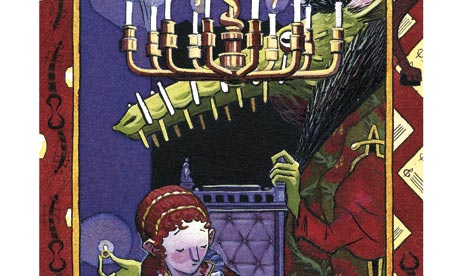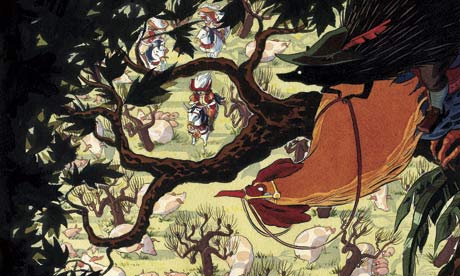
Today's fairy tale booklet (Day 7 and the last one!) at The Guardian is themed 'Animals'. You can read more about the seven part series at my previous post.
Animals in fairytales: Marina Warner looks at the role animals play in fairytales. Warner is the author of From the Beast to the Blonde: On Fairy Tales and Their Tellers, an excellent book I can't recommend highly enough.
Here's an excerpt:
The anthropologist Claude Lévi-Strauss commented that animals were "bons à penser" (good to think with), and fairytales speak through beasts to explore common experiences – fear of sexual intimacy, terror and violence and injustice, struggles for survival. A tradition of articulate, anthropomorphised creatures of every kind is as old as literature itself: animal fables and beast fairytales are found in ancient Egypt and Greece and India, and the legendary Aesop of the classics has his storytelling counterparts all over the world, who use crows and ants, lions and monkeys, ravens and donkeys to satirise the follies and vices of human beings and display along the way the effervescent cunning and high spirits of the fairytale genre.
Today's theme also gives us another three fairy tales to read:
The fairytale of Beauty and the Beast by Jeanne-Marie Le Prince de Beaumont
The fairytale of the Heart of a Monkey retold by Andrew Lang
The fairytale of Hans My Hedgehog by the Brothers Grimm, translated by Jack Zipes
The illustrations for this set are by Eleanor Davis.
There is also an extra article on the site today:
Get off of my tuffet, Muffet by John Harris: I can't lament the demise of nursery rhymes when my three-year-old sings rock'n'roll classics instead
Last week, a survey by the reading charity Booktrust decisively revealed the tragic fate of our old friend the nursery rhyme. Of 2,500 parents, only 36% regularly used such folk poetry with their kids, and over 20% said they never bothered at all. Among younger parents, things were even worse: 33% of mums and dads aged between 16 and 24 reckoned nursery rhymes were "too old-fashioned" to interest their offspring,and 20% of the same cohort questioned their educational value. Somewhat predictably, there was also a gender fault-line within the research: whereas, for example, 78% of women knew all the words to Incy Wincy Spider, the figure among men was a miserable 45%.
And don't miss the reader comments on the last one! Many opinions there...


The illustrations are also available in higher-res and more complete form at Davis's LiveJournal here: http://squinkyelo.livejournal.com/51059.html – link via http://forbiddenplanet.co.uk/blog/2009/beauty-and-the-beast
ReplyDelete